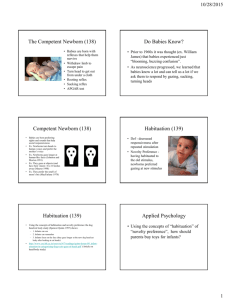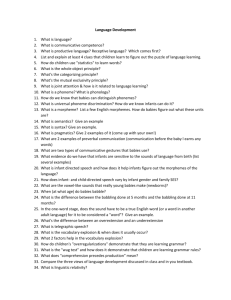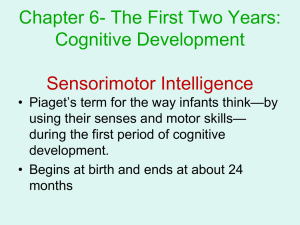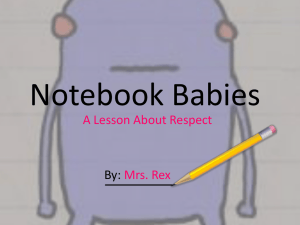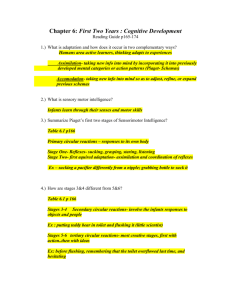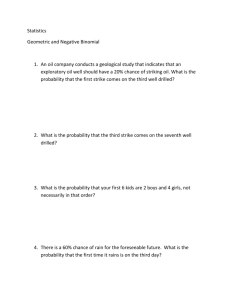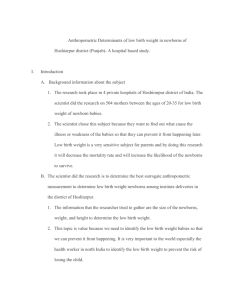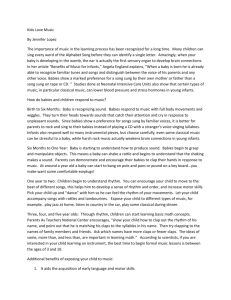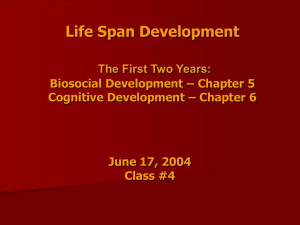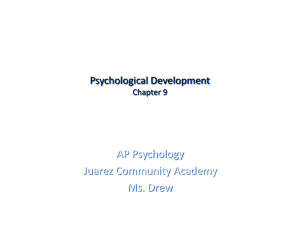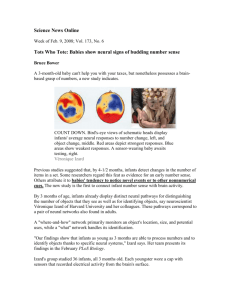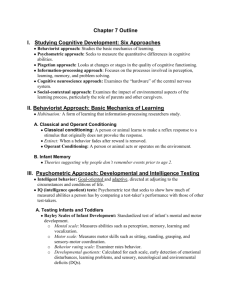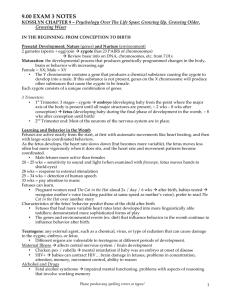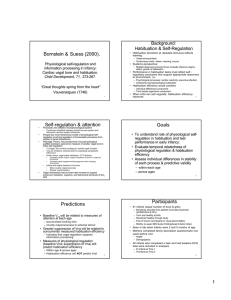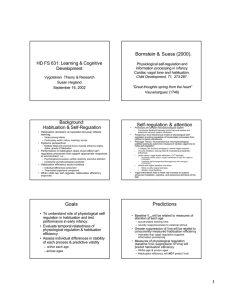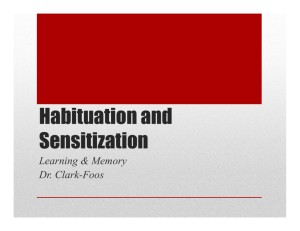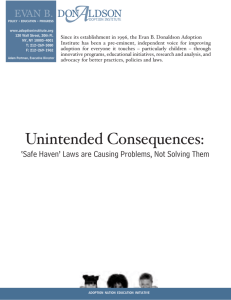The Competent Newborn (138) Do Babies Know? Competent
advertisement
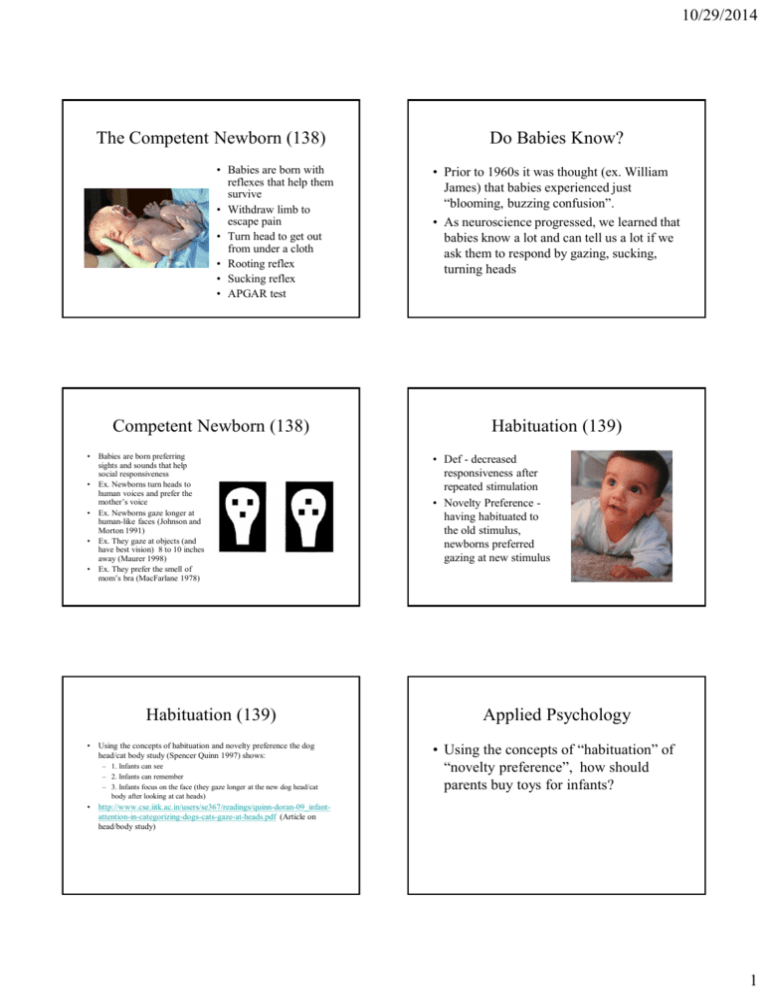
10/29/2014 The Competent Newborn (138) • Babies are born with reflexes that help them survive • Withdraw limb to escape pain • Turn head to get out from under a cloth • Rooting reflex • Sucking reflex • APGAR test Competent Newborn (138) • Babies are born preferring sights and sounds that help social responsiveness • Ex. Newborns turn heads to human voices and prefer the mother’s voice • Ex. Newborns gaze longer at human-like faces (Johnson and Morton 1991) • Ex. They gaze at objects (and have best vision) 8 to 10 inches away (Maurer 1998) • Ex. They prefer the smell of mom’s bra (MacFarlane 1978) Habituation (139) • Using the concepts of habituation and novelty preference the dog head/cat body study (Spencer Quinn 1997) shows: – 1. Infants can see – 2. Infants can remember – 3. Infants focus on the face (they gaze longer at the new dog head/cat body after looking at cat heads) Do Babies Know? • Prior to 1960s it was thought (ex. William James) that babies experienced just “blooming, buzzing confusion”. • As neuroscience progressed, we learned that babies know a lot and can tell us a lot if we ask them to respond by gazing, sucking, turning heads Habituation (139) • Def - decreased responsiveness after repeated stimulation • Novelty Preference having habituated to the old stimulus, newborns preferred gazing at new stimulus Applied Psychology • Using the concepts of “habituation” of “novelty preference”, how should parents buy toys for infants? • http://www.cse.iitk.ac.in/users/se367/readings/quinn-doran-09_infantattention-in-categorizing-dogs-cats-gaze-at-heads.pdf (Article on head/body study) 1 10/29/2014 Infancy and Childhood (140) • Brain and mind develop together • Association areas of the cortex (linked to memory, thinking, language) are the last brain areas to develop. • An infant’s biological development underlies his psychological development Brain Development (140) Infancy and Childhood (140) QuickTime™ and a TIFF (Uncompressed) decompressor are needed to see this picture. Brain Development (140) • At birth you have most of your 23 billion nerve cells, but, your nervous system is immature • After birth neural networks develop which allow us to walk, talk, remember Maturation (140) • A genetically designed biological growth process • Enables orderly changes in behavior relatively uninfluenced by experience • Maturation sets the basic course of development, experience adjusts it. • Brain and mind develop together • Association areas of the cortex (linked to memory, thinking, language) are the last brain areas to develop. • An infant’s biological development underlies his psychological development • age 3 to 6 - frontal lobe neural networks are most active • Age 6 to puberty neural networks supporting language and agility are most active Maturation & Infant Memory (141) • Our lack of neural connections accounts for our lack of memory prior to our 3rd year • We have little conscious memory prior to 3 or 4 • (Newcombe 2000) 10 yr olds will recognize only 1 in 5 of their preschool friends’ pictures but they will physiologically respond (skin perspiration) to their former preschool friends’ pictures 2 10/29/2014 Motor Development (141) Maturation v. Training • Our developing brain enables physical coordination • the sequence of motor development is universal (roll then sit; creep then walk) but the timing is not • Baby development reflects a maturing nervous system NOT imitation or training. (evidence - blind babies) • Genes play a major role identical twins tend to sit up together! Jean Piaget (143) • Studying children’s IQ’s (Mental Age/Chronological Age x 100 = IQ) in the 1920’s and noticed that children of the same age tended to give the same wrong answers • He concluded that children know differently not less than adults • He theorized that children develop cognitively in stages Cognitive Development (143) • By 6 months of age we can comprehend – Permanence – number – simple physical laws Jean Piaget (143) A 12 Minute Interview of Piaget - Food for Thought 3
